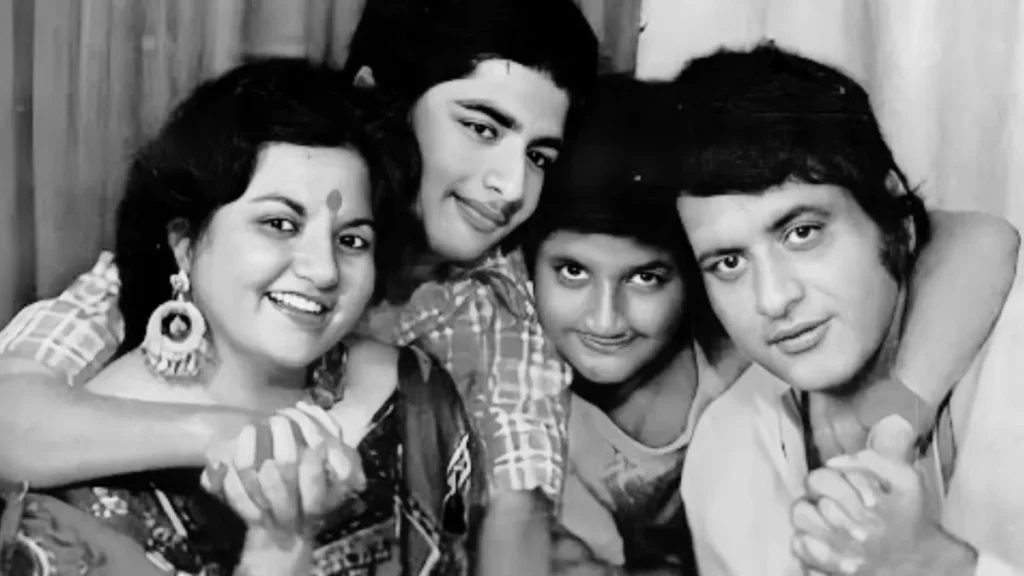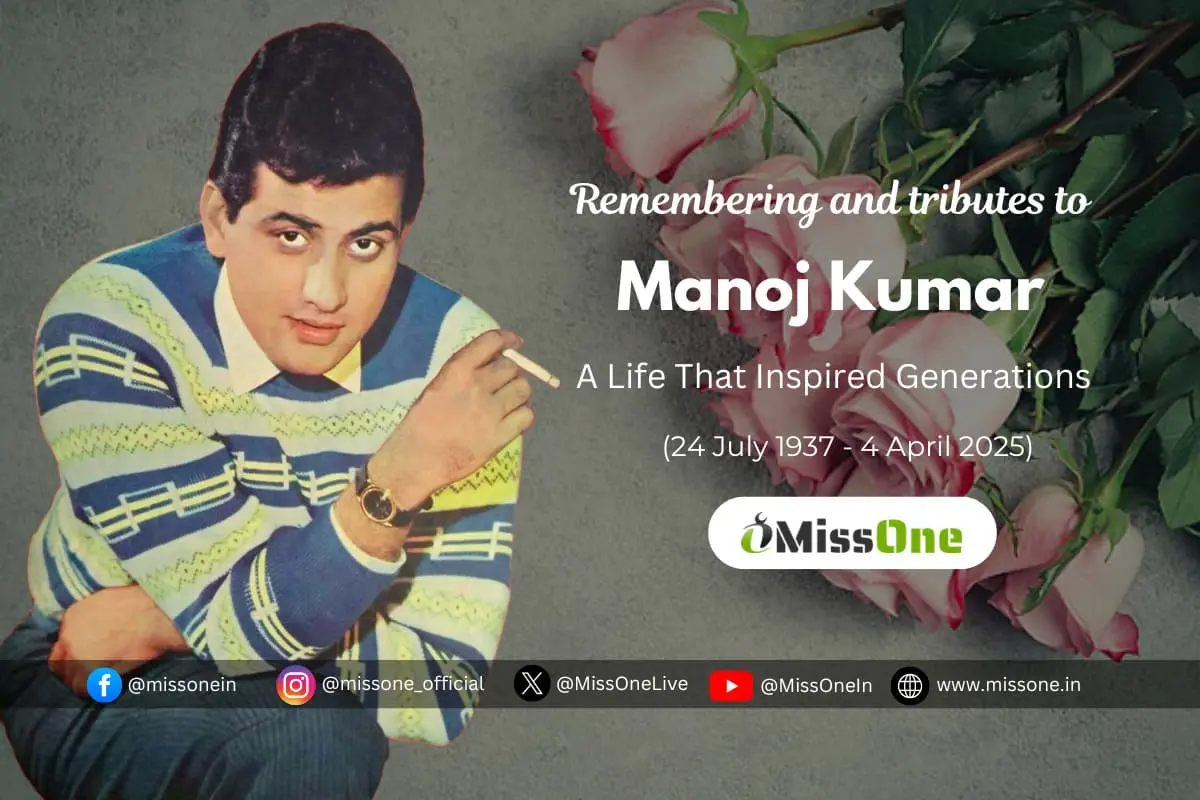When I heard the news of Manoj Kumar’s passing on April 4, 2025, it felt like a piece of my childhood slipped away. For someone like me, who grew up watching Hindi films with my family, Manoj Kumar wasn’t just an actor or filmmaker he was a symbol of pride, a man who brought India’s spirit to life on the silver screen. Today, as I sit down to write this tribute, I find myself remembering not just his films but the legacy of a man who loved his country deeply and shared that love with millions. This is my way of honoring him a simple reflection on his incredible journey, from a boy in Abbottabad to the “Bharat Kumar” of Indian cinema.
A Childhood Shaped by Change
Manoj Kumar was born Harikrishan Giri Goswami on July 24, 1937, in Abbottabad, a small town in what was then British India (now part of Pakistan). His early years were simple, rooted in a Punjabi Hindu Brahmin family. Imagine a young boy running through the streets of Abbottabad, unaware that history would soon uproot his life. In 1947, when he was just 10 years old, the Partition of India changed everything. His family, like millions of others, left their home behind and moved to Delhi, seeking a fresh start in a newly independent nation.
Life in Delhi wasn’t easy for the Goswamis. They settled in Vijay Nagar, a refugee colony, where survival meant hard work and resilience. Manoj, even as a child, carried a quiet strength. He loved stories whether they came from books or the films he watched with wide-eyed wonder. His family wasn’t wealthy, but they valued education and culture. That love for learning stayed with him as he attended Hindu College at the University of Delhi, where he graduated with a degree in arts. College wasn’t just about books for him, though it was where he discovered his passion for theater, a spark that would later light up his cinematic journey.
I can almost picture him as a young man, sitting in a dimly lit room, dreaming of the silver screen. He idolized Dilip Kumar, one of Bollywood’s greatest stars, and even took his stage name “Manoj Kumar” from a character Dilip played in the 1949 film Shabnam. That choice wasn’t just a whim it was a sign of the dreamer he was, someone who wanted to honor the art he loved.
Family: The Anchor of His Life
Behind every great man is a family that keeps him grounded, and for Manoj Kumar, that anchor was his wife, Shashi Goswami, and their two sons, Vishal and Kunal. He met Shashi in the early 1960s, and their love story was as real as it gets e no dramatic movie twists, just a quiet bond that grew stronger with time. They married in 1963, and Shashi became his rock, supporting him through the ups and downs of a film career that wasn’t always smooth.

Manoj was a private man, not one for gossip or headlines about his personal life. He kept his family close, away from the spotlight. His sons, Vishal and Kunal, grew up with a father who was both a legend and a simple family man. Kunal even stepped into acting, debuting in Manoj’s 1981 film Kranti, though his career didn’t take off the way his father’s did. Vishal tried his hand at singing but eventually stepped back from the limelight. In interviews, Manoj often spoke of his love for his grandchildren, a soft side that showed how much family meant to him, even as his health declined in later years.
I think that’s what made him so relatable. He wasn’t just a star he was a husband, a father, a grandfather. Remembering him now, I see a man who balanced fame with the quiet joys of home, a rare thing in a world that often demands everything from its icons.
The Journey to Bollywood: A Dream Takes Flight
Manoj Kumar’s entry into films wasn’t a fairy tale. He didn’t have a famous last name or a godfather to open doors. He moved to Mumbai in the 1950s, a young man with big dreams and little else. His first role came in 1957 with Fashion, a small part where he played an 80-year-old man. It wasn’t glamorous, but it was a start. A few more forgettable roles followed Sahara (1958), Chand (1959), Honeymoon (1960) but he kept going, determined to make his mark.
His breakthrough came in 1962 with Hariyali Aur Rasta, a romantic drama opposite Mala Sinha. The film was a hit, and suddenly, people noticed this tall, deep-voiced actor with a quiet intensity. That same year, he starred in Shaadi and Dr. Vidya, proving he could hold his own. But it was 1964’s Woh Kaun Thi?, a mystery thriller with Sadhana, that showed his versatility. Playing a doctor caught in a web of suspense, he won hearts and hinted at the star he’d become.
Then came 1965 a year that changed everything. Shaheed, a film about freedom fighter Bhagat Singh, wasn’t just a movie for Manoj it was a mission. He co-wrote the script, pouring his heart into the story of a revolutionary who inspired a nation. The film was a success, and Prime Minister Lal Bahadur Shastri praised it. Manoj even donated his National Award money for Shaheed to Bhagat Singh’s family, a gesture that showed his character. That role earned him the nickname “Bharat Kumar,” a title he’d carry proudly for decades.
The Golden Years: A Filmmaker with a Purpose
The late 1960s and 1970s were Manoj Kumar’s golden era. After Shaheed, he took on Upkar (1967), a film inspired by Shastri’s slogan “Jai Jawan Jai Kisan.” He didn’t just act in it he directed, wrote, and edited it, playing a farmer-turned-soldier named Bharat. The song “Mere Desh Ki Dharti” became an anthem, and the film won him his first Filmfare Best Director Award. It was a blockbuster, cementing his image as the voice of patriotism in Bollywood.
He followed it with Purab Aur Paschim (1970), a story about Indian values clashing with Western culture. Again, he directed and starred as Bharat, showing a generation what it meant to be proud of their roots. The film struck a chord, and its songs like “Hai Preet Jahan Ki Reet” still echo today. Then came Roti Kapada Aur Makaan (1974), a raw look at unemployment and survival. With stars like Amitabh Bachchan and Zeenat Aman, it was a hit that tackled real issues, earning him more acclaim.
By now, Manoj Kumar was more than an actor he was a filmmaker with a purpose. His films weren’t just entertainment; they were lessons in love for India. Kranti (1981) was his biggest canvas yet, a historical epic about the freedom struggle. Directing his idol Dilip Kumar alongside Shashi Kapoor and Hema Malini, he created a golden jubilee hit that inspired merchandise like Kranti T-shirts and caps. It was a high point, a film that showed his vision at its grandest.
Beyond Patriotism: A Versatile Talent
While he’s best known for patriotic roles, Manoj Kumar wasn’t a one-note actor. He shone in romantic dramas like Patthar Ke Sanam (1967) and Neel Kamal (1968), showing a softer side. Shor (1972), which he directed and starred in, was a moving story of a father fighting to restore his son’s voice, with the haunting “Ek Pyar Ka Nagma Hai.” He even won a Filmfare Best Actor Award for Be-Imaan (1972), proving he could play complex characters beyond the “Bharat” mold.
I love how he mixed genres thrillers, dramas, epics yet always brought something uniquely his own. That hand-over-the-face gesture? It became his trademark, a quirky touch that fans adored (and comedians later poked fun at). He wasn’t afraid to experiment, like casting Pakistani actors in Clerk (1989), a bold move for its time.

Awards and Honors: A Legacy Recognized
Manoj Kumar’s work didn’t go unnoticed. He won a National Film Award for Shaheed in 1967, followed by another for Upkar. His seven Filmfare Awards including Best Director for Upkar, Best Actor for Be-Imaan, and Best Editing for Shor showed his all-around talent. In 1992, the Government of India gave him the Padma Shri, a nod to his contributions. The biggest honor came in 2016 with the Dadasaheb Phalke Award, the highest accolade in Indian cinema. I can still see him, frail but proud, accepting it in a wheelchair, a standing ovation ringing in his ears.
He also got the Filmfare Lifetime Achievement Award in 1999, a tribute to a career that spanned over 40 years. States like Madhya Pradesh even named awards after him, and there were calls for a Bharat Ratna. These honors weren’t just trophies they were proof of how much he meant to India.
The Later Years: A Quiet Fade
After Kranti, Manoj Kumar’s career slowed. Films like Clerk (1989) and Maidan-E-Jung (1995) didn’t match his earlier magic, and he stepped away from acting. His last directorial effort, Jai Hind (1999), starred Kunal but flopped. He turned to politics briefly, joining the Bharatiya Janata Party in 2004, but his heart stayed with cinema.
In his later years, health issues took over heart problems, liver cirrhosis, pneumonia. He was bedridden for a while, yet his son Kunal said he stayed connected to his family, especially his grandkids. When he passed away at 87 in Mumbai’s Kokilaben Dhirubhai Ambani Hospital, the nation mourned. His funeral, with state honors and a tricolor-draped bier, was a fitting goodbye to “Bharat Kumar.”
Why We’ll Always Remember Him
As I write this, I keep thinking about what Manoj Kumar meant to us. He wasn’t just a star he was a storyteller who made us feel proud to be Indian. His films weren’t loud or flashy; they were heartfelt, rooted in the soil of this country. Songs like “Mere Desh Ki Dharti” still give me goosebumps, a reminder of the India he loved.
Remembering him now, I see a man who lived with purpose. He didn’t chase fame he chased meaning. His tribute isn’t just in these words or the awards on his shelf; it’s in the way his films still speak to us, decades later. He honored India with every frame he shot, every story he told. And in doing so, he left us a legacy to honor too.
So here’s to Manoj Kumar a boy from Abbottabad, a dreamer in Delhi, a legend in Mumbai. Rest in peace, Bharat Kumar. You’ll always be remembered.

